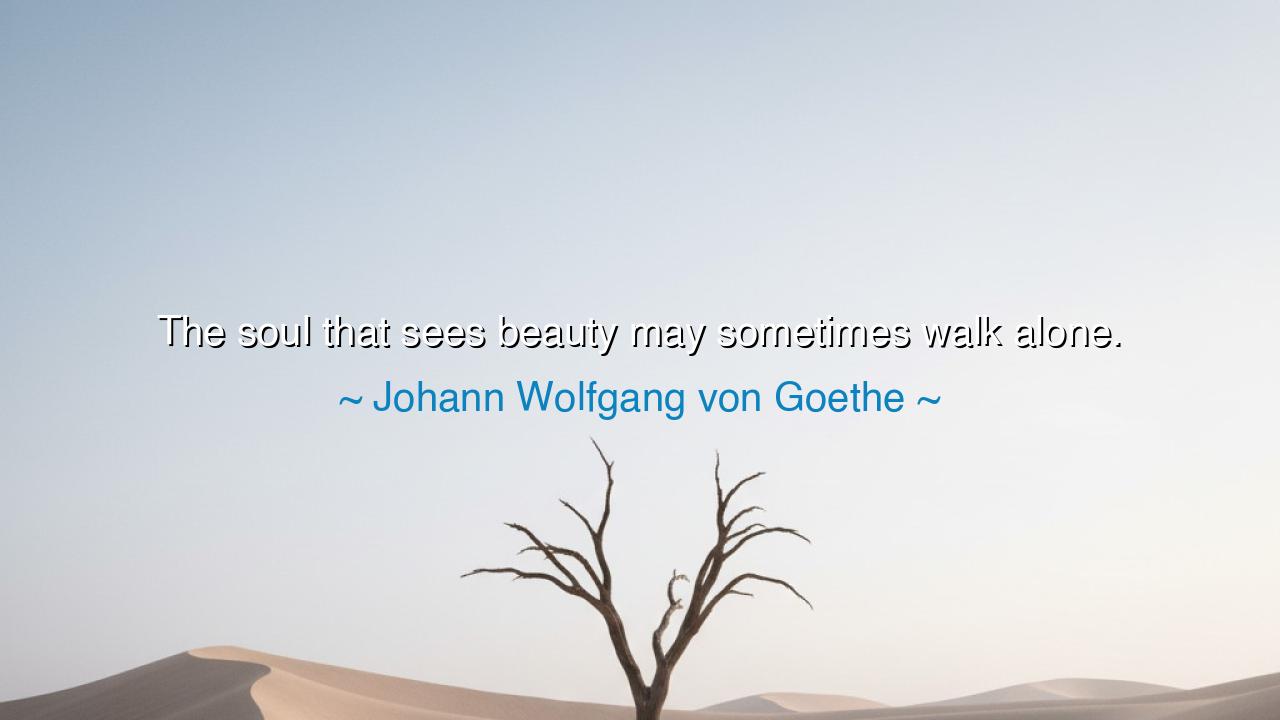
The soul that sees beauty may sometimes walk alone.






In the vast tapestry of human existence, there are moments when a profound truth is revealed to those with eyes to see. Johann Wolfgang von Goethe, a man whose wisdom has transcended time, offers us one such revelation in his words: “The soul that sees beauty may sometimes walk alone.” This simple yet powerful statement speaks to the very essence of the human experience—how those who are attuned to the deeper beauty of life may find themselves estranged from the common path, often walking a solitary road in their pursuit of higher truths. For to see beauty in its truest form is to perceive the world not as it is, but as it could be—elevated, sublime, and radiant with meaning.
Goethe's insight is not merely a poetic reflection, but a call to understand the deep nature of creativity and vision. The soul that perceives beauty sees what others may overlook—the grace of a fleeting moment, the harmony in dissonance, the nobility in the ordinary. Such a soul is often in conflict with the world around it, for society, bound by its routines and its conventions, rarely values the deeper, transcendent beauty that one might behold in solitude. The path of the visionary, therefore, is often one of loneliness, for those who walk it are seldom understood by those whose eyes are bound by the mundane.
Consider the great philosopher Socrates, who, though surrounded by his disciples, often walked alone in his search for the truth. His relentless pursuit of wisdom set him apart from the majority, who were more concerned with the fleeting concerns of the physical world. In his soul, Socrates sought something far more profound—the eternal beauty of wisdom itself. This often led him into conflict with those around him, for they could not understand the deep joy he derived from his solitary pursuit. Yet, despite the loneliness, Socrates’ path led to the discovery of immortal truths that continue to inspire us today.
Likewise, the great poet William Blake, a man ahead of his time, often found himself walking alone in the pursuit of artistic and spiritual beauty. His work, filled with visions of angels, mysticism, and divine imagery, was met with confusion and even disdain by many of his contemporaries. But Blake, undeterred by the scorn of others, embraced his solitude, knowing that the soul that sees beauty often finds its companions in the realms of dreams and vision rather than in the material world. His life and work remind us that those who seek the deeper, more profound aspects of existence may often find themselves standing alone, but they also possess a richness that is not easily understood by the masses.
What then, can we learn from Goethe’s words? The lesson is clear: those who see beauty with a deeper understanding are not bound by the superficial judgments of the world. Their souls are attuned to a higher frequency, and they walk a path that few can follow. It is not a path of isolation, but of elevation. The beauty they see is a gift, a vision that demands solitude in order to fully appreciate and nurture. And though they may walk alone, they are never truly alone, for the beauty they see connects them to the eternal.
For those who seek to walk this path, let us first embrace the beauty that surrounds us in our daily lives. Do not simply look with the eyes, but see with the soul. Seek the beauty in the ordinary, the mundane, the fleeting moments that most overlook. Whether it is in the delicate petal of a flower, the quiet rhythm of the stars, or the tender act of kindness in another’s gaze, let us cultivate the ability to see the divine in the details.
And as we do so, we must remember that solitude is not something to fear but something to embrace. Solitude is the fertile soil in which the seeds of deeper wisdom and beauty grow. To walk alone is not to walk in despair, but in the company of the eternal, of those who have walked this path before us, from Socrates to Blake to Goethe himself. As we walk alone, we are in the company of those who have embraced beauty with courage and conviction. The lesson of the ages is that the soul that sees beauty, though it may sometimes walk alone, is never truly isolated. It is always connected to the vast and eternal wellspring of truth and vision that transcends time and space.
Finally, let us take action: in our daily lives, let us choose to see with deeper vision, to embrace our moments of solitude, and to cultivate the beauty that lies within and around us. Whether in silence or in the company of like-minded souls, let us always seek the beauty that speaks to the very core of our being. In doing so, we will walk a path that, though solitary at times, leads us to a richer, more profound connection with the world and with ourselves.






AAdministratorAdministrator
Welcome, honored guests. Please leave a comment, we will respond soon